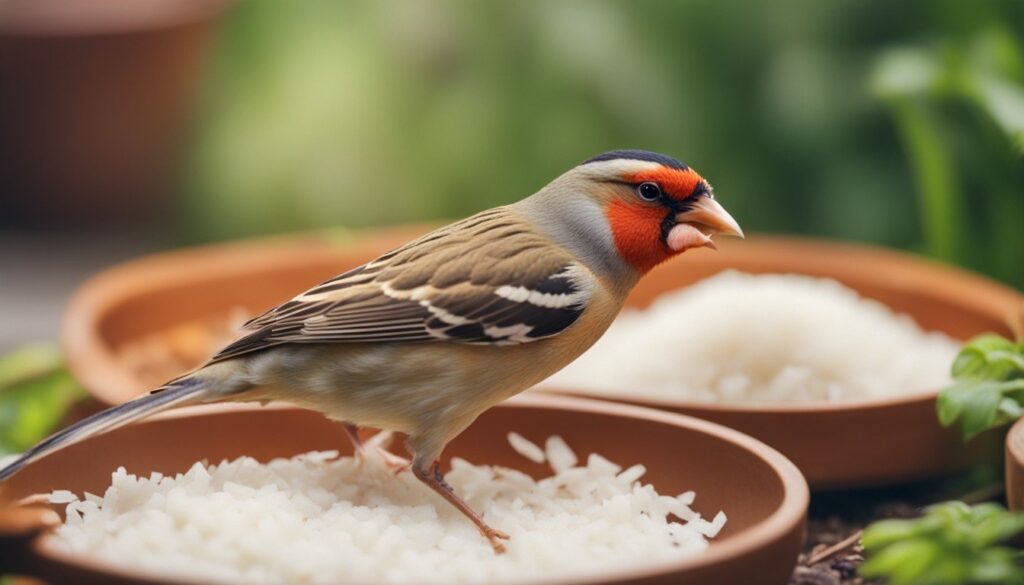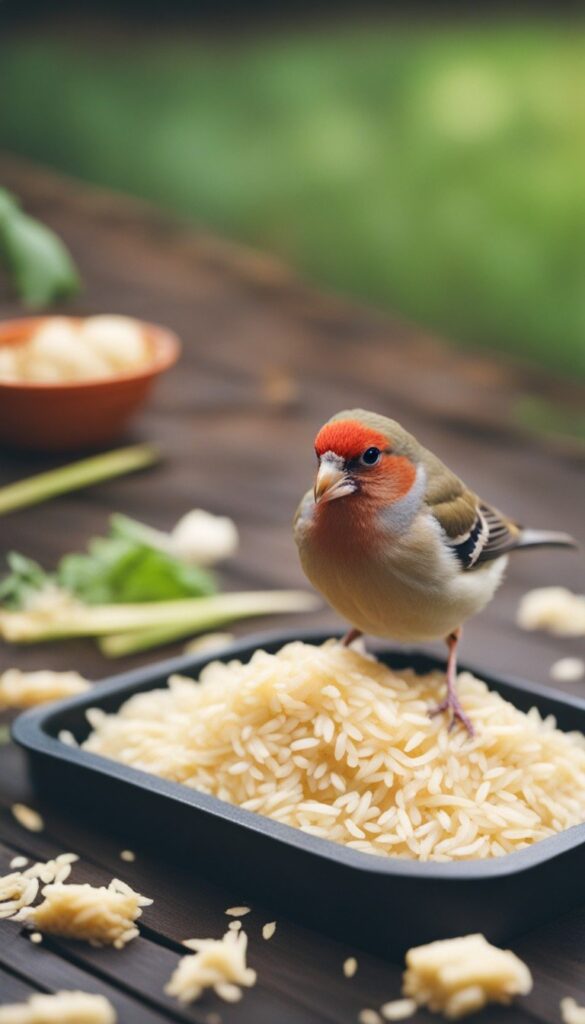Can birds eat rice? Rice is commonly eaten in many cultures all over the world. Most bird owners and lovers frequently ask this question. The simple answer to the question is Yes, birds can eat rice.

However, know that it’s safe to feel birds rice is not enough, you have to do it right. In this blog post, we’ll dive deep into the topic of whether rice is a safe and suitable food for birds, the do’s and don’ts and how to feed birds rice.
Can Birds Eat Rice?
Rice can be eaten by birds. In fact, adding rice to a bird’s diet can make it richer in nutrients. It contains important nutrients like proteins and carbs needed for a bird’s well-being and good health. However, it’s crucial to keep in mind that not all types of rice are suitable for consumption by birds.
Cooked vs Uncooked Rice
There’s a prevalent urban legend that uncooked rice can turn birds into feathery popcorn by expanding in their bellies, causing a spectacular “birdplosion.”
But let me set the record straight – that’s pure fiction! Uncooked rice is, in fact, a perfectly safe and nutritious snack for our feathered friends. In some ways, you could say it’s like their version of a protein bar, offering more nutrients than the soggy, reheated stuff we humans prefer. So, rest assured, the rice won’t make them take flight like fireworks in the night sky.
White vs Brown Rice
When considering the rice variety to share with our avian pals, you’ve got two options on the menu: white and brown rice. Both are bird-friendly, but if you’re looking to treat your backyard guests to a nutritious feast, brown rice is the MVP. It’s got more fiber and an extra dose of nutrients compared to white rice. Think of it as the whole-grain option for our fine-feathered friends.
Benefits Of Rice For Birds
Rice is an excellent energy source for birds, especially during chilly winters, thanks to its abundance of carbohydrates. It’s not just about energy; rice also packs a punch of healthy nutrients like protein, fiber, iron, thiamine, niacin, and magnesium. When it comes to choosing between white and brown rice, the latter takes the nutritional crown, boasting more protein, fat, carbohydrates, and fiber.
The best part? Birds can safely savor rice in any form, as long as it’s not been deep-fried or jazzed up with seasonings, not even a pinch of salt. Even our smaller feathered friends, like finches and sparrows, come prepared with beaks specially designed to break down rice grains into tiny, easily digestible pieces.
Here’s a helpful table outlining the nutrients in rice and the benefits they provide to our feathered friends:
| Nutrient | Benefit |
|---|---|
| Carbohydrates | Provides essential energy, especially in cold winters |
| Protein | Aids in tissue repair and supports the immune system |
| Fiber | Regulates digestion and prevents constipation |
| Iron | Contributes to healthy bone and beak growth, immune support |
| Thiamine | Converts food into energy and supports the nervous system |
| Niacin | Maintains healthy skin, nerves, and digestion |
| Magnesium | Regulates muscle and nerve function, supports bone health |
| Calcium | Builds and maintains strong bones and beaks |
| Selenium | Supports the immune system, helps prevent cell damage |
| Manganese | Regulates metabolism and supports bone health |
Understanding these nutrients and their benefits can help ensure that the birds in your area enjoy a balanced and healthy diet.
Types of Rice Birds Can Eat
Birds have quite a buffet of rice options to choose from, including:
- White Rice: This is the standard, go-to rice, and birds can munch on it whether it’s cooked or uncooked.
- Brown Rice: Consider this the nutritious cousin of white rice. It’s loaded with extra fiber and nutrients that are a treat for our feathered friends.
- Wild Rice: Surprisingly, wild rice is a type of grass seed, but it’s often lumped in with other rice varieties. Birds can safely enjoy it and reap its nutritional benefits.
- Basmati Rice: This long-grain rice, famous in Indian and Middle Eastern cuisines, is a hit with our avian pals, whether it’s cooked or served au naturel.
Preparing Rice for Birds
Want to feed rice to birds in your backyard? you can simply follow the steps below.
- Rinse the Rice: Before cooking or serving the rice, give it a good rinse under running water to get rid of any dust or impurities.
- Cook the Rice (Optional): If you opt to cook the rice, follow the instructions on the package. Skip the salt and seasonings, as they can be harmful to birds.
- Cool Down the Rice: After cooking, let the rice cool down completely before offering it to your bird.
- Serve the Rice: You can serve the rice as is or mix it with other foods like fruits, vegetables, or birdseed for a balanced meal.
Remember, when feeding your bird, it’s all about balance. Rice can be a healthy addition to their diet, but it shouldn’t replace essential foods like fruits, veggies, and birdseed. Moderation is the name of the game!
ALSO CHECK
Risks and Precautions When Feeding Rice to Birds
Feeding rice to our feathered friends is generally safe, but there are some important considerations and precautions to keep in mind:
- Overfeeding: Just like with any food, overdoing it with rice can lead to health issues in birds, such as obesity. Moderation is key.
- Uncooked Rice: While uncooked rice won’t harm birds, it can be a bit tough for their digestive systems. To make it easier on them, it’s a good idea to soak uncooked rice in water before offering it to your bird.
- Seasoned or Flavored Rice: Steer clear of sharing seasoned or flavored rice with your bird. These types often contain ingredients like salt or spices that can be harmful to our feathered friends. Stick to plain and simple rice to keep your bird’s diet safe and sound.
